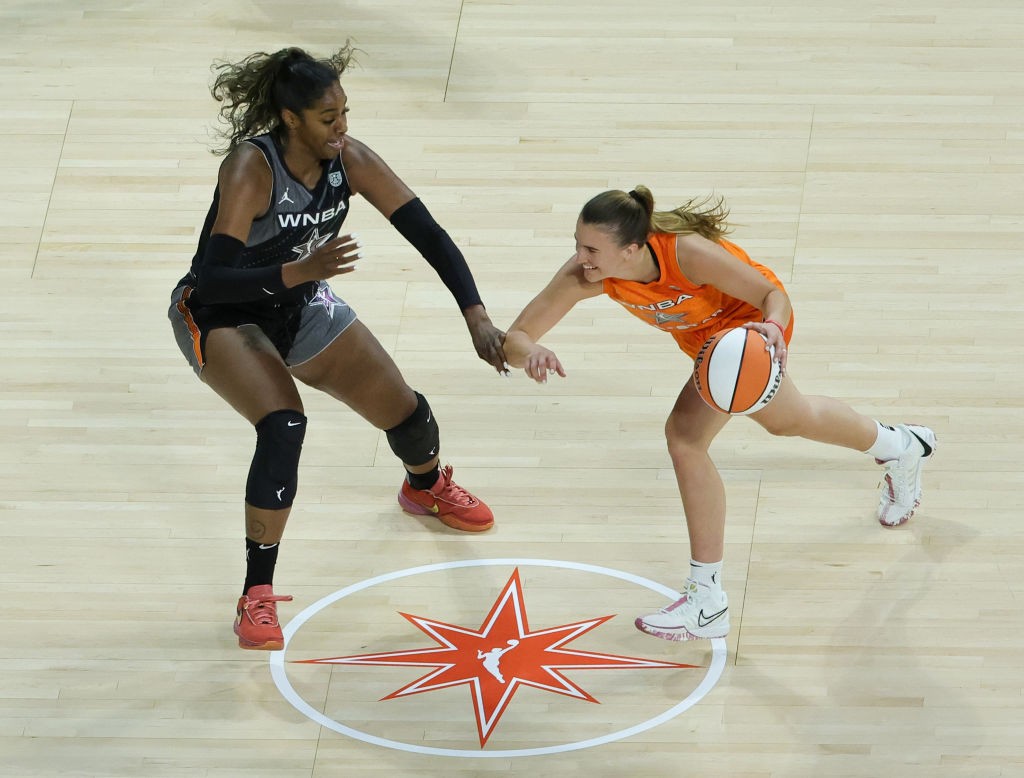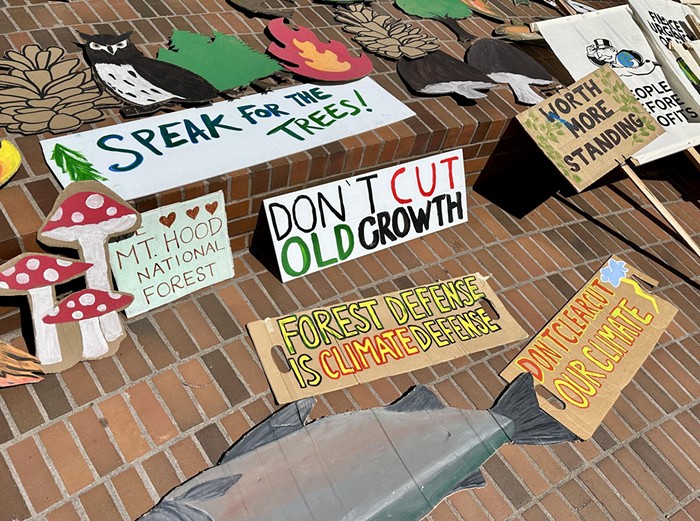Jordan Dinwiddie is a creative director at Wieden + Kennedy, but she wasn’t working in her professional capacity on Nike’s account with the agency when she had the idea to design an eye-catching billboard with a simple message: Bring the WNBA to Portland.
Dinwiddie wanted to get to work on the billboard last year, but got sidetracked by other commitments. Early this year, however, when Jenny Nguyen of Portland bar The Sports Bra launched a petition to bring a team to Portland, Dinwiddie decided to get involved.
“I don’t think 2,500 [signatures] is going to show how much this city really does eat, breathe, live women’s sports,” Dinwiddie said. “I just thought I would push it out in the way my advertising brain knows how.”
The billboard went up down the street from Providence Park on April 29, the date of a showcase National Women's Soccer League (NWSL) matchup between the Portland Thorns and Angel City FC.
“We wanted to send a really big message, so we thought a really big billboard would help,” Dinwiddie said.
The unveiling of the billboard came on the heels of both the release of the petition and of a February event at The Sports Bra, the country’s first dedicated women’s sports bar, that featured Sen. Ron Wyden making the case directly to WNBA Commissioner Cathy Engelbert that Portland is a perfect fit for the league.
In the months since the unveiling of the billboard, Dinwiddie has hit the city streets for the cause.
“I don't have a driver’s license, so I have literally walked to people’s businesses—thank God Portland is walkable—to give [out] posters to put into businesses’ windows,” Dinwiddie said.
Dinwiddie’s efforts reflect the largely grassroots nature of the campaign to bring the WNBA back to the city, which has been led not by politicians or a major investor, but by community members who want to see more women’s sports in the city.
Portland has had a WNBA team before. The Portland Fire played in the city from 2000 to 2002 before folding after just three seasons, but Nguyen said the team’s short tenure wasn’t the result of a lack of support from the community.
“They had a huge, devout and strong following,” Nguyen wrote in an email to the Mercury. “Not through any fault of the team itself, the Fire folded because of bureaucracy.”
There is, among the bid’s boosters, little concern about whether Portlanders would show up to support the second iteration of a WNBA team. The WNBA has grown considerably in the last 20-plus years, and Portland remains an underserved sports market that in recent years has become nationally known for its pathbreaking support for women’s sports.
The Thorns are perhaps the most visible example of that support, routinely drawing league-leading crowds to Providence Park in their decade-long existence, but the women’s basketball teams at Oregon and Oregon State have also ranked near the top of the NCAA in attendance. A Portland team would have a natural rivalry with the Seattle Storm, one of the best-supported teams in the WNBA.
“Right now, I know that the city is ready for the [WNBA],” Dinwiddie said. “Sports fans have come really, really far in their support of women’s sports, and now is the time—particularly in the W. We know there is a drastic need for more teams.”
The biggest question looming over Portland’s would-be expansion bid is who will own the team. The Portland Fire’s demise after the 2002 season came because there was no one in the city who stepped forward to buy the team after then-Trail Blazers owner Paul Allen took his name out of the running.
If Portland is to land a team at some point in the next couple of years, they’ll need an owner or an ownership group with significant financial resources to emerge.
There is hope that such a person is out there. Nguyen said there has been interest from multiple parties in leading the bid, but that only one person has come forward thus far who has the “cred and the pocketbook” to own a team.
That person may be Kirk Brown, the co-founder of the company now known as ZoomInfo, who confirmed last year his interest in buying a WNBA franchise. Brown, whose net worth is reportedly around $1 billion, grew up in the Northwest.
The push to bring the WNBA to Portland comes at a moment of considerable uncertainty in much of the rest of the city’s professional sports landscape.
The Thorns, for instance, have reportedly been on the market since late last year when owner Merritt Paulson announced he would sell the team after his role in covering up abuse perpetrated by former manager Paul Riley was revealed.
Multiple outlets reported at the time that an all-woman group led by former Nike executive Melanie Brown had been meeting with Paulson and was preparing to submit a bid of around $60 million, but there have been few details about the state of that bid or a timeline for the sale of the team since.
Meanwhile, questions have swirled around the future of the Trail Blazers since Allen died in 2018 and his sister Jody took control of the organization. Nike co-founder Phil Knight offered a bid in excess of $2 billion to buy the team last year, but Allen rejected the offer.
That saga appears poised to stretch on for at least another year, as does another group’s push to bring a Major League Baseball team to the city—with the latest plans for a stadium focused on the Lloyd Center site in Northeast Portland and the RedTail Golf Course in Beaverton.
In many ways, landing a WNBA team would be simpler than bringing baseball to the city. The Trail Blazers have voiced their support for the effort, as have city officials like Mayor Ted Wheeler, and the team could easily take up occupancy at the Moda Center or possibly the Memorial Coliseum.
The WNBA is, for the moment, remaining tight-lipped about where exactly it is looking to expand—but has hinted that more news may be forthcoming relatively soon.
At the league All Star game in Las Vegas earlier this month, Engelbert said that the league’s “conversations with potential ownership groups are headed in the right direction,” and that “we will have some more news to announce about that at a later date this season.”
“We’re focusing on adding additional corporate partners to our roster,” Engelbert said. “Working on right-sizing our future media rights deal, the valuation of all of our assets. We’re making a lot of positive progress there.”
Last year, Engelbert told The Athletic she is aiming to add two teams to the league to start play as soon as the 2024 season.
There is stiff competition for teams. Nashville, Toronto, Philadelphia, and both major cities in the Bay Area have also been floated as potential expansion cities, with the WNBA and women’s sports as a whole enjoying increasing exposure and commercial success in recent years.
But as Nguyen has told Engelbert, Portland is a standout city for women’s sports.
“There’s support here,” Nguyen wrote, “and she’s well aware of it.”




















